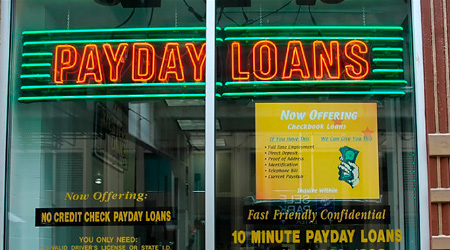What Is A Payday Loan?

A payday loan is a short-term personal loan, normally less than $500, to cover short-term expenses until the following payday. Obviously, payday loans require the borrower to be actively employed with one or more recent pay stubs and a checking account to prove their ability to repay the loan. Most payday loans average between $200-$2,500 and interest rates are normally around 25%. The average length of a payday loan is roughly 2 weeks as any longer the accumulated interest becomes exorbitant and cost prohibitive.
Payday loans originated in California in the early to mid-1990s when they were approved by the California state legislature. As soon as these types of loans became legal they rapidly spread across the nation and became established in most other states. The reason for legal recognition of payday loans is because at the time there was no incentive for large financial institutions to offer unsecured personal loans to consumers. Most banks and credit unions were focused on larger types of transactions such as mortgages and auto loans. In a relatively short period of time the payday loan industry has become a $50 billion a year industry with annual projected revenue growth of 25% or more.
There are pros and cons to payday loans and both sides are adamant in their positions. Payday loan supporters feel that short-term unsecured personal loans were an underrepresented financial option which can be invaluable tool for most consumers. The contention is that the fees and relatively high interest rate is commensurate with increased risk and unsecured nature of a short term personal loan. Opponents feel that payday loan companies take advantage of consumers who are desperate for cash and are often uninformed or ill-equipped to understand the intricacies of the payday loan industry. They contend that payday loans burden individuals already in financially precarious situations which inevitably forces them into bankruptcy.
Payday loans if used correctly can pay for an unexpected auto repair or emergency medical situation. Then a week or two later the loan can be paid in full and the consumer has successfully navigated a financial obstacle. Problems arise when the consumer is unable to pay off the payday loan at which point penalties and interest get added to the principal balance and causes them to get further and further behind. It is not unheard of for a payday loan of a few hundred dollars to balloon into a few thousand dollars in a relatively short period of time. While many states have usury laws preventing lenders from charging exorbitant interest rates, not every state is created equal. It is common for payday loan companies to develop business relationships with banks and other states with more lax usury laws.
The payday loan industry is an ever evolving business model balanced on a tight rope satisfying consumer demand while navigating government regulation. The question is how far are they willing to push the envelope of excessive fees and interest, justified or not, before laws are enacted which limits payday lender earning potential and placing a financial stranglehold on its participants. Payday loan and title loan companies have received increase attention and oversight in recent years and are on notice to keep their business practices aboveboard to protect consumers.







